Search the Special Collections and Archives Portal
Search Results
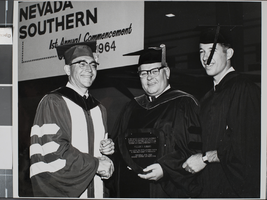
Photograph of Nevada Southern University Commencement, Las Vegas, June 03, 1964
Date
1964-06-03
Archival Collection
Description
The first commencement for Nevada Southern University (NSU). Pictured here include Governor Grant Sawyer; Dr. William Carlson, first dean of Nevada Southern; and Jon Cobain, President of the Class of 1964. Handwritten description provided on back of image: "N.S. 1st Commencement 6/3/64. Governer Sawyer congratulating William D. Carson, first dean and administrative head of Nevada Southern, upon being presented a plague of appreciation from the Class of 1964. Jon Cobain, President of the Class of 1964 on the right." Group Creators credit goes to Photo/Rama.
Image
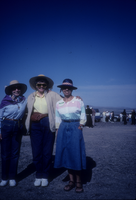
Slide of Sisters Rosemary Lynch and Klaryta Antoszewska standing with Christine Buismato at a demonstration near the Nevada Test Site, March 25, 1990
Date
1990-03-25
Archival Collection
Description
Color image (from left to right) of Sister Rosemary Lynch, Sister Klaryta Antoszewska, and Christine Buismato during a Franciscan weekend of peaceful demonstrations against nuclear testing.
Image
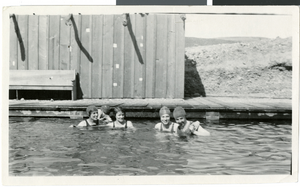
Photograph of Doris Hancock and fellow teachers at Furnace Creek Ranch, Death Valley, California, circa March, 1925
Date
1925
Archival Collection
Description
Doris Hancock with Zelpha LaCoss, Mary West Ronnow, two unidentified women at the Furnace Creek Ranch for a teacher's outing; Note on photo sleeve: "Plunge - Furnace Creek Ranch - Death Valley [CA.] March - 1925 [L. Group of 3 - L. 1. Zelpha La Cross (?), R. Mary West Ronnow, Rear. Unknown. R. Group of 2 - L. Unknown R. Doris Hancock] [Teachers outing - 1925]". Site Name: Furnace Creek Ranch (Death Valley, Calif.)
Image

Photograph of Virginia Page, Miss Las Vegas, Sands Hotel, June 2, 1957
Date
1957-06-02
Archival Collection
Description
Nineteen year old Virginia Page from Brighton, England, winner of Meet Me In Las Vegas contest. Page, as Miss Las Vegas, won a trip to Las Vegas for a week starting June 2, 1957. She was crowned by Yolande Donlan, Chairman of the panel of judges. Transcribed on the back of the picture: " 'Miss Las Vegas' (Virginia Page) received her sash and crown from Yolande Donlan, chairman of the panel of judges."
Image
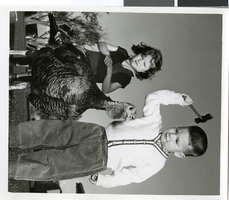
Photograph of Troy Pritchard at the annual "Turkey Trot," Sands Hotel, Las Vegas, circa mid 1950s - early 1960s
Date
1955 to 1964
Archival Collection
Description
Three-year-old Troy Pritchard chasing a turkey in the annual "Turkey Trot" held at the Sands Hotel in Las Vegas, Nevada. Little Troy is holding a small axe as he stands beside an unidentified young girl.
Image
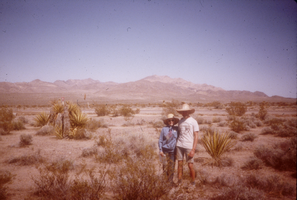
Slide of Sister Rosemary Lynch and friend at the American Peace Test demonstration near the Nevada Test Site, March 20, 1988
Date
1988-03-20
Archival Collection
Description
Color image of Sister Rosemary Lynch (right) standing with Fritz [der Herde] at the 10-day demonstration known as "Reclaim the Test Site" that was organized by American Peace Test, an anti-nuclear testing group.
Image
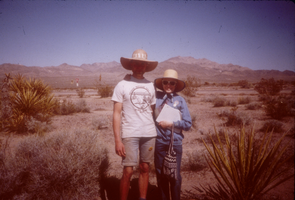
Slide of Sister Rosemary Lynch and friend at the American Peace Test demonstration near the Nevada Test Site, March 20, 1988
Date
1988-03-20
Archival Collection
Description
Color image of Sister Rosemary Lynch (right) standing with Fritz [der Herde] at the 10-day demonstration known as "Reclaim the Test Site" that was organized by American Peace Test, an anti-nuclear testing group.
Image
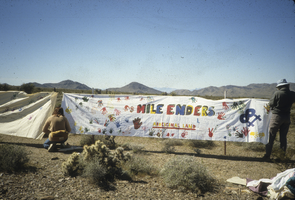
Slide of protesters with a large banner at the Reclaim the Test Site demonstrations near the Nevada Test Site, March 12, 1988
Date
1988-03-12
Archival Collection
Description
Color image of some of the protesters at a 10-day demonstration known as "Reclaim the Test Site" that was organized by American Peace Test, an anti-nuclear testing group. This banner is covered in handprints and reads: "Mile Enders - South Australia Aboriginal Land."
Image

Slide of Ian Zabarte and others standing in front of a teepee at the Reclaim the Test Site demonstrations near the Nevada Test Site, March 20, 1988
Date
1988-03-20
Archival Collection
Description
Color image of (left to right) Ian Zabarte, Sister Rosemary Lynch, Kathy Thorpe and Ray Yowell during a 10-day demonstration known as "Reclaim the Test Site" that was organized by American Peace Test, an anti-nuclear testing group.
Image

Slide of Ian Zabarte and others standing in front of a teepee at the Reclaim the Test Site demonstrations near the Nevada Test Site, March 20, 1988
Date
1988-03-20
Archival Collection
Description
Color image of (left to right) Ian Zabarte, Sister Rosemary Lynch, Kathy Thorpe and Ray Yowell during a 10-day demonstration known as "Reclaim the Test Site" that was organized by American Peace Test, an anti-nuclear testing group.
Image
Pagination
Refine my results
Content Type
Creator or Contributor
Subject
Archival Collection
Digital Project
Resource Type
Year
Material Type
Place
Language
Records Classification
